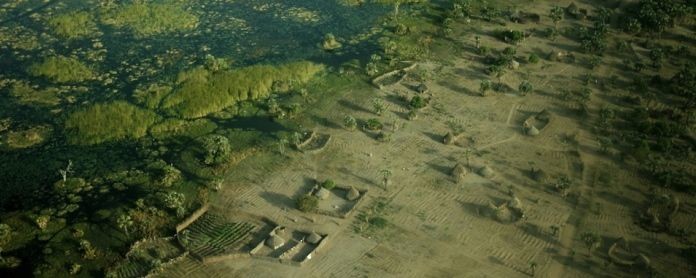The United Nations says that up to 40,000 people are displaced to islands in the Bahr el Jebel River and surrounding wetlands in Unity State’s Panyijar County.
Payinjiar County is the southernmost in Unity State and was the last place of refuge for thousands of people who fled southward during government offensives into Unity State from the northwest in January and February.
The county was also attacked by raiders from neighboring Lakes State. At the county headquarters about half of the houses have been burned down, as well as villages elsewhere.
Dominique Burgeon, Director of the UN Food and Agriculture Organization’s Emergency Division, visited the area by canoe last Thursday, 20 March, accompanied by other humanitarian officials.
“At least 35 to 40,000 IDPs are sheltering on 20 small islands around Nyal, having fled their homes, and coming from as far away as Malakal, Bentiu, Leer, Bor and Juba in an effort to escape the violence that broke out on 15 December,” the director wrote in an account published on the agency’s website.
Burgeon said in one area the residents are recovering from massive flooding last year and also they have lost 6,500 cattle in a raid. “Travelling for 40 minutes in a canoe we then reached an island hosting 2,000 IDPs. Immediately, we could see the devastating conditions in which they were living, but it wasn’t until we spoke to them that we began to understand the true magnitude of their despair,” he recalled.
The official recounted meeting a woman named Nyawuok Jiech, who fled her home and village in Jau, along the Sudanese border when it was attacked. Her husband and father were killed and she escaped with her seven children and her mother, said Burgeon.
“They walked for four days until they reached Pariang and then continued walking for a further 20 days until they reached this island in Nyal. They have nothing – no possessions, just one another. When we met the family, they were sitting under a tree in the middle of nowhere – this is where they live today,” he said.
“There is no shelter, no mosquito netting, no sanitation and water comes from the surrounding swamps. Above all, there is no food at all. When we arrived they were scavenging palm nuts from the trees. For Nyawuok, however, this is better than her home; at least she feels safe here… for now,” he added.
The UN official also told the story of an elderly woman named Regina Thot Ryat. He said she walked for nine days from Bentiu with four of her grandchildren and three orphans in her care. She does not know what has happened to any of their parents. She has nothing, and only relies on wild roots and lily flowers for food.
A 13-year-old boy named Dakar was also on the island with his mother and four siblings. His father was killed. He tries to get fish from the swamps and his mother collects wild foods.
“When we asked if people were dying from hunger, they said yes,” said Burgeon, adding, “But people do not report these deaths as they still have their pride and their dignity, no matter how destitute they are.”
Photo: An aerial view of homes in Panyjiar county, bordering the Sudd swamplands (Jessica Hatcher/IRIN)




